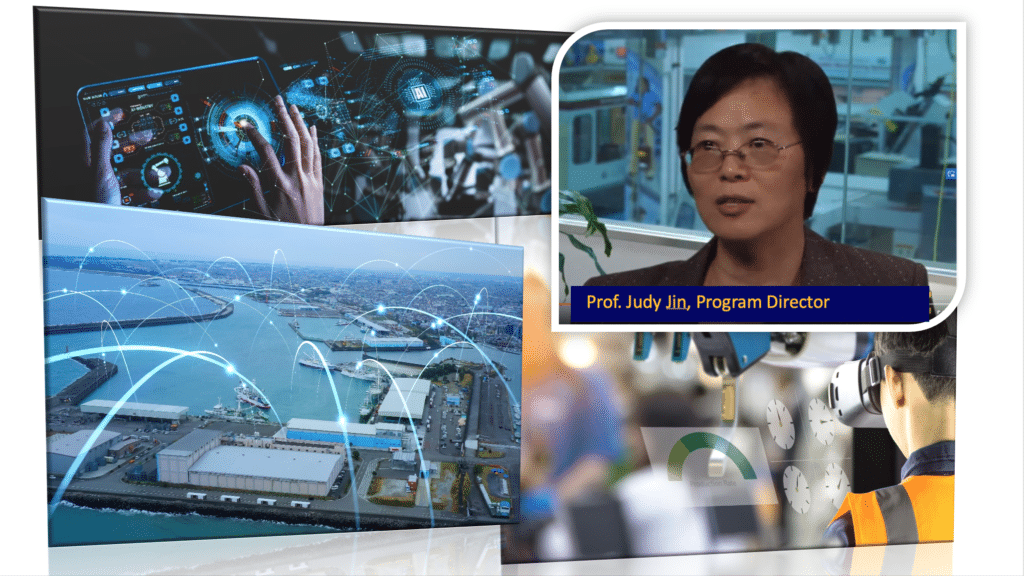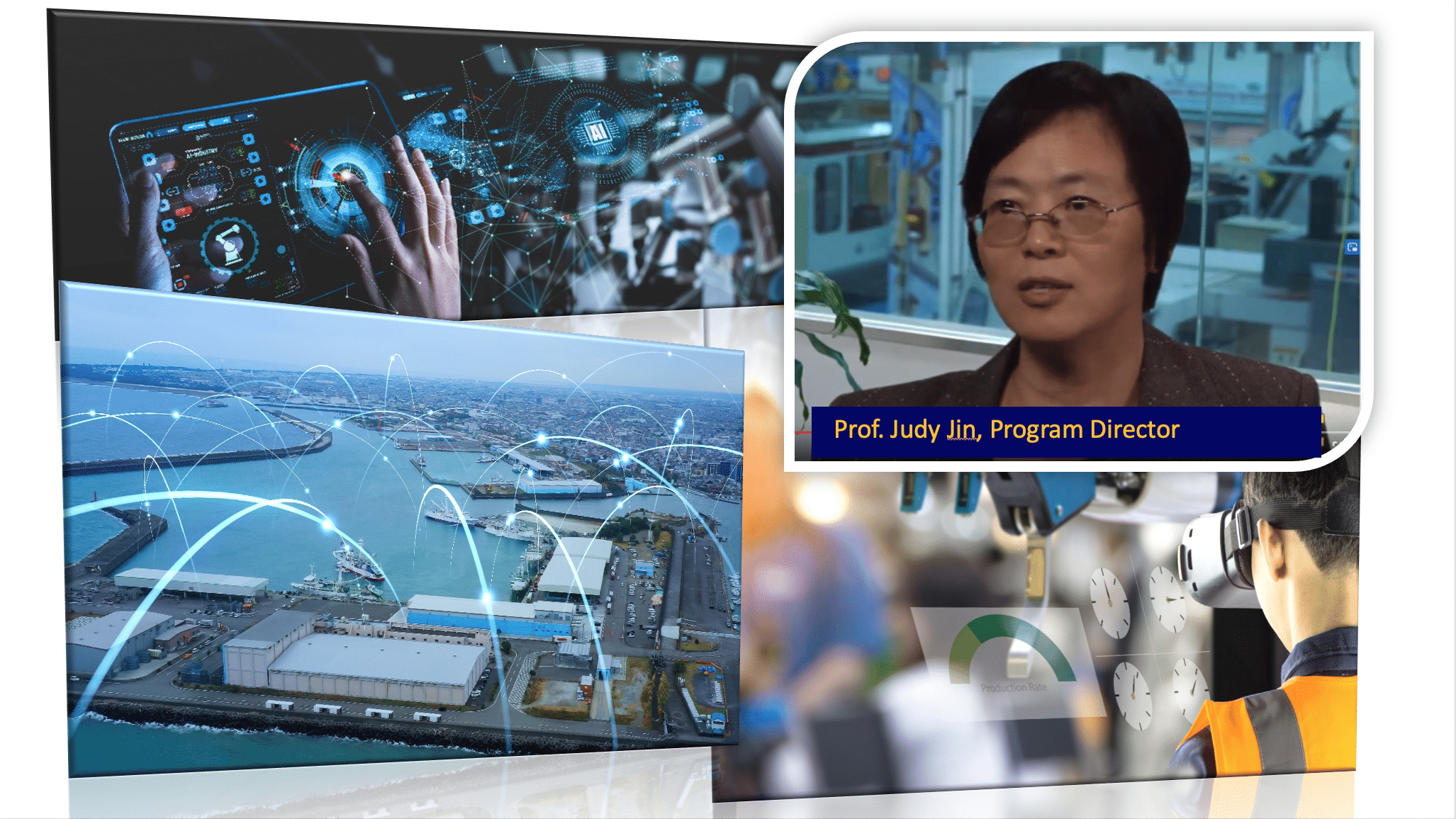ISD Plays a Transformative Role in Smart Manufacturing

Smart Manufacturing, defined by the National Institute of Standard Technologies, is a “fully integrated, collaborative manufacturing system that responds in real time to meet changing demands and conditions in the factory, in the supply network, and in customer needs.”
In the transformation to smart manufacturing, one of the critical issues in many manufacturing companies is how to make a cost-effective decision that can take consideration of sophisticated interactions among different entities in a manufacturing system.
Dr. Judy Jin, Program Director of Manufacturing Engineering in Integrative Systems + Design (ISD) said, “The smart manufacturing transformation requires us to combine manufacturing and business innovations together. Our Manufacturing Program aims to meet this industry need by training technical experts and leaders who will master broad and solid knowledge of manufacturing technologies as well as have a system-view and managerial skill for making smart decisions.”
Integrative Training for Leaders
ISD’s Master of Engineering in Manufacturing (MENG-MFG) program provides integrative curriculum to train students with depth within specialization in manufacturing and breadth across disciplines among system optimization and business management with a collaboration with U-M’s Ross School of Business. The program also provides students with experiential learning to build real-world problem-solving ability through industry sponsored capstone projects, immersive learning in labs, factory tours, and much more.
ISD Smart Manufacturing students gain hands-on knowledge, skills in real applications, and advanced technologies in industry to improve the quality and efficiency of manufacturing systems, and address the intelligent adaptation of manufacturing processes.
“Our graduates with cross-disciplinary skillsets are well prepared for taking a technical leader and engineering manager position in the new era of smart manufacturing,” Dr. Jin said.
Competitive Career Pathways
According to Deloitte’s 2018 Skills Gap in Manufacturing Study: “The industry is experiencing exciting and exponential change, as technologies such as artificial intelligence (AI), robotics, and Internet of Things (IoT) are rapidly changing the workplace. While some predicted that these new technologies would eliminate jobs, we have found the reverse — more jobs are actually being created.”
To meet the increasing demands of a new manufacturing workforce and leaders, the ISD MENG-MFG degree provides students with solid training in both engineering fundamentals and advanced manufacturing technologies, which provides ISD graduates with competitive employment opportunities through four career pathways:
- Manufacturing Design and Digitalization
- Production Systems and Quality Control
- Additive Manufacturing
- Smart Manufacturing
Smart Manufacturing Seminar Series
ISD hosts a Smart Manufacturing Seminar Series to showcase experts in various aspects of manufacturing-relevant technologies, including research and applications that require cutting-edge technologies for Smart Manufacturing.
Seminar speakers discuss key building technologies for Smart Manufacturing, such as
- advanced materials/structures and manufacturing processes;
- computer simulations and augmented reality for product/process design;
- sensors, automation and robots for automatic production monitoring and execution;
- data analytics and optimizations for production planning, quality control, and optimal equipment operation and maintenance; and
- industrial IoT, network security, cloud computing and optimal decision-making for robust supply chain management and enterprise operation.
“Our speakers are quite diverse from academic institutions, industrial companies, national labs, federal funding agencies, etc. It serves as a good platform for promoting our faculty collaborations both internally and externally. It also provides an opportunity for our students to get a broad review about smart manufacturing technologies to enhance their knowledge and future careers” Dr. Jin said.
Filling Skill Gaps in Smart Manufacturing
To fill the skills gaps in smart manufacturing, ISD’s Manufacturing Program has renovated its curriculum to prepare students with essential knowledge and skillsets. For example, Dr. Chinedum Okwudire, Associate Professor of Mechanical Engineering and ISD, worked closely with a team of U-M faculty to create the “Additive Manufacturing” master’s pathway to explore and connect topics with smart manufacturing more deeply. The faculty team included Dan Cooper, Assistant Professor of Mechanical Engineering; Kazu Saitou, Professor of Mechanical Engineering; Kevin Field, Associate Professor of Nuclear Engineering and Radiological Sciences; and Kira Barton, Associate Professor of Mechanical Engineering and the Robotics Institute.
“Our industry partners demand employees who really understand the theory and practice of Smart Additive Manufacturing,” Dr. Okwudire said. “We will keep growing. This is a rapidly changing field. It’s dynamic. We will keep updating the additive manufacturing pathway to continue to make it relevant to industry and meeting the needs of industry.”
Dr. Judy Jin with other five UM faculty worked together to define and teach key building techniques for design and operation of primary entities in smart manufacturing, which include:
- Emerging Smart Technologies to Advance Manufacturing
- Smart Facility Planning & Scheduling
- Smart Production Systems (SPS)
- Smart Manufacturing Processes & Equipment
- Smart Modular Design for Manufacturing
- Smart Quality Assurance.
The faculty are Raed Al Kontar, Assistant Professor of Industry and Operations Engineering; Kira Barton, Associate Professor of Mechanical Engineering and the Robotics Institute; Pingsha Dong, Professor of Naval Architecture and Marine Engineering; Semyon Meerkov, Professor of Electrical Engineering and Computer Science; and Chinedum Okwudire, Associate Professor of Mechanical Engineering and ISD. “We will be continuously empowering our students with emerging smart technologies like computational simulations, data analytics, advanced sensing, IoT, cloud computing, etc.,” Dr. Jin said. “So, our graduates will be ready for taking a leader role in smart manufacturing and hit the ground running after graduation.”
